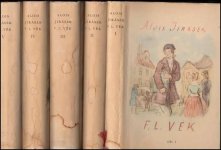Patrick Murtha
Reader
I have this thing for romans-fleuves, book series and sequences, whatever you want to call them. I have a lot in progress. I am not a big one for strict definitions, but in my loose way, I would count any fiction that extends to three volumes or more. Usually there is a chronological or other prescribed reading order, but not always (Faulkner).
Apart from crime fiction, here are series I am embarked on.
Joan Aiken (Wolves Chronicles)
Honoré de Balzac (La Comédie humaine)
L. Frank Baum (Oz)
Arnold Bennett (Clayhanger sequence)
James Blish (Cities in Flight)
James Branch Cabell (Biography of the Life of Manuel)
Cao Xueqin (The Story of the Stone)
James Fenimore Cooper (Leatherstocking)
Mazo de la Roche (Jalna)
Alexandre Dumas (Three Musketeers)
Lawrence Durrell (Alexandria Quartet)
James T. Farrell (Studs Lonigan)
William Faulkner (Yoknapatawpha)
Madeleine L’Engle *
Compton Mackenzie (Sinister Street sequence)
John Moore (Elmbury Trilogy)
Anthony Powell (A Dance to the Music of Time)
Simon Raven (Alms for Oblivion)
Dorothy Richardson (Pilgrimage)
Jules Romains (Men of Good Will)
Upton Sinclair (Lanny Budd)
C.P. Snow (Strangers and Brothers)
T.S. Stribling (Vaiden trilogy)
Anthony Trollope (Barsetshire, Palliser)
Emile Zola (Rougon-Macquart)
* ALL of Madeleine L’Engle’s work is linked by recurring characters, one of the largest such projects since Balzac and Faulkner. There is no over-arching reading order, although there are chronological sub-units.
Apart from crime fiction, here are series I am embarked on.
Joan Aiken (Wolves Chronicles)
Honoré de Balzac (La Comédie humaine)
L. Frank Baum (Oz)
Arnold Bennett (Clayhanger sequence)
James Blish (Cities in Flight)
James Branch Cabell (Biography of the Life of Manuel)
Cao Xueqin (The Story of the Stone)
James Fenimore Cooper (Leatherstocking)
Mazo de la Roche (Jalna)
Alexandre Dumas (Three Musketeers)
Lawrence Durrell (Alexandria Quartet)
James T. Farrell (Studs Lonigan)
William Faulkner (Yoknapatawpha)
Madeleine L’Engle *
Compton Mackenzie (Sinister Street sequence)
John Moore (Elmbury Trilogy)
Anthony Powell (A Dance to the Music of Time)
Simon Raven (Alms for Oblivion)
Dorothy Richardson (Pilgrimage)
Jules Romains (Men of Good Will)
Upton Sinclair (Lanny Budd)
C.P. Snow (Strangers and Brothers)
T.S. Stribling (Vaiden trilogy)
Anthony Trollope (Barsetshire, Palliser)
Emile Zola (Rougon-Macquart)
* ALL of Madeleine L’Engle’s work is linked by recurring characters, one of the largest such projects since Balzac and Faulkner. There is no over-arching reading order, although there are chronological sub-units.

